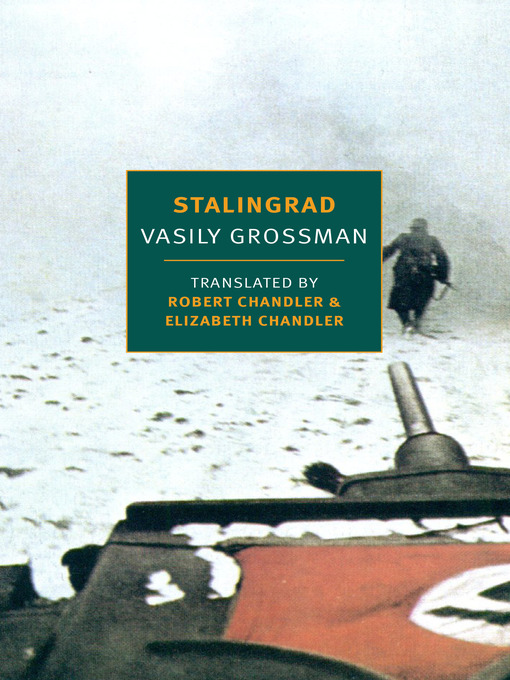- Popular Magazines
- Just Added
- Cooking & Food
- Fashion
- Health & Fitness
- Home & Garden
- News & Politics
- See all magazines collections
The story told in Vasily Grossman’s Stalingrad unfolds across the length and breadth of Russia and Europe, and its characters include mothers and daughters, husbands and brothers, generals, nurses, political activists, steelworkers, and peasants, along with Hitler and other historical figures. At the heart of the novel is the Shaposhnikov family. Even as the Germans advance, the matriarch, Alexandra Vladimirovna, refuses to leave Stalingrad. Far from the front, her eldest daughter, Ludmila, is unhappily married to the Jewish physicist Viktor Shtrum. Viktor’s research may be of crucial military importance, but he is distracted by thoughts of his mother in the Ukraine, lost behind German lines.
In Stalingrad, published here for the first time in English translation, and in its celebrated sequel, Life and Fate, Grossman writes with extraordinary power and deep compassion about the disasters of war and the ruthlessness of totalitarianism, without, however, losing sight of the little things that are the daily currency of human existence or of humanity’s inextinguishable, saving attachment to nature and life. Grossman’s two-volume masterpiece can now be seen as one of the supreme accomplishments of twentieth-century literature, tender and fearless, intimate and epic.
-
Creators
-
Publisher
-
Release date
June 11, 2019 -
Formats
-
Kindle Book
-
OverDrive Read
- ISBN: 9781681373287
-
EPUB ebook
- ISBN: 9781681373287
- File size: 3245 KB
-
-
Languages
- English
-
Reviews
-
Publisher's Weekly
Starred review from April 29, 2019
Grossman’s epic, sprawling novel from 1952 is a masterpiece of intertwined plots that cascade together in a long sequence of militaristic horror. Grossman (1905–1964), best known for this book’s sequel, Life and Fate, was on the scene as a Soviet war reporter during WWII’s Nazi siege of Stalingrad, and the novel teems with his firsthand observations. The action is told from dozens of perspectives, ranging from humble workers to Hitler himself. Most of the characters have some relationship to Stalingrad’s Shaposhnikov family. After an opening dinner party, the Shaposhnikovs are separated by a war that has drawn ever nearer to their city. Alexandra, the family matriarch, is forced into exile with her oldest daughter, Ludmila. Ludmila’s husband, Viktor Shtrum, an important scientist, is worried that his Jewish mother has been a victim of the Holocaust. Alexandra’s second daughter, Marusya, and her daughter, Vera, display heroism in their wartime work in an orphanage and a hospital. The beautiful Zhenya, Alexandra’s youngest daughter, has left Nikolay Krymov, a communist thinker, and is being courted by Pyotr Novikov, a gifted military strategist. Two of the family’s grandchildren, Tolya and Seryozha, are in military units defending the city. When the bombing of Stalingrad begins, Grossman cuts between viewpoints, rewinding time over and over again. A spectacular afterword details the extent of censorship the text suffered under Stalin. As a stand-alone novel, this is both gripping and enlightening, a tour de force. When considered as a whole with Life and Fate, this diptych is one of the landmark accomplishments of 20th-century literature. -
Kirkus
Starred review from April 1, 2019
An extraordinary novel by war correspondent Grossman (1905-1964), completing, with Life and Fate, a two-volume Soviet-era rejoinder to War and Peace. Improbably, Grossman survived the purges of the Stalin era even though the dictator's gaze often fell on him. Toward the end of Stalin's life, Grossman set to work on the pair of books that would recount what Russians call the Great Patriotic War. His characters come from both sides of the battle and include a German lieutenant who crosses the Don River with his company in triumph but, by the end of the cycle, comes to understand the error of his ways. Grossman's great subject, in his fiction as well as his reportage, was the terrible nature of totalitarianism. His characters are given to saying things that in the wrong ears could land them in trouble, as when an officious commissar insists that a neighborhood bomb shelter is meant to save people like him, to which a woman, hiding from the shelling, replies, "The fat brute--anyone would think he's a German. He thinks Hitler's here already. But we're Soviet citizens. We're all equal. He's the one who should be thrown out to die--not our children!" Soldiers, nurses, schoolteachers: All wither under the months of street-by-street fighting, as do the refugees who flood in from the surrounding countryside, having "heard the roar of the approaching avalanche." For them and millions of others, Grossman writes in a burst of poetry toward the end of the volume, the "fire of Stalingrad was the fire of Prometheus," promising undying resistance to fascism even as the great fish in the Volga hug the riverbanks, hoping to keep safe from the rain of metal, and the ants, mice, bees, and other tiny creatures of the Soviet earth try to accustom themselves to "the earth's constant trembling." A classic of wartime literature finally available in a comprehensive English translation that will introduce new readers to a remarkable writer.COPYRIGHT(2019) Kirkus Reviews, ALL RIGHTS RESERVED.
-
Formats
- Kindle Book
- OverDrive Read
- EPUB ebook
subjects
Languages
- English
Loading
Why is availability limited?
×Availability can change throughout the month based on the library's budget. You can still place a hold on the title, and your hold will be automatically filled as soon as the title is available again.
The Kindle Book format for this title is not supported on:
×Read-along ebook
×The OverDrive Read format of this ebook has professional narration that plays while you read in your browser. Learn more here.


